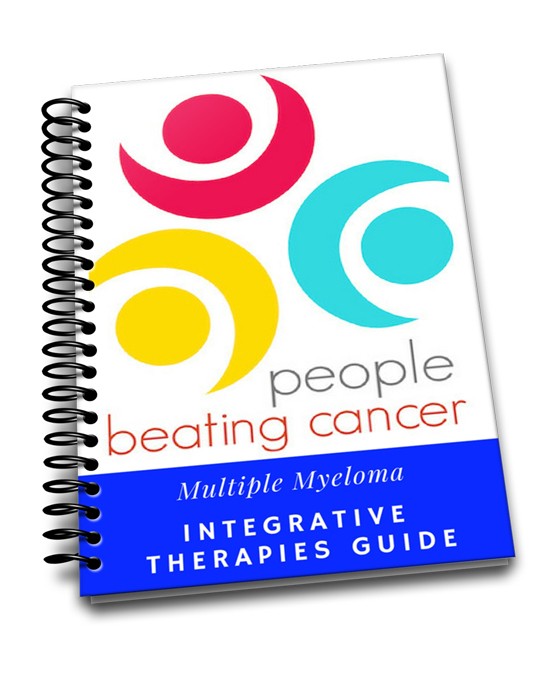
Recently Diagnosed or Relapsed? Stop Looking For a Miracle Cure, and Use Evidence-Based Therapies To Enhance Your Treatment and Prolong Your Remission
Multiple Myeloma an incurable disease, but I have spent the last 25 years in remission using a blend of conventional oncology and evidence-based nutrition, supplementation, and lifestyle therapies from peer-reviewed studies that your oncologist probably hasn't told you about.
Click the orange button to the right to learn more about what you can start doing today.
- You are here:
- Home »
- Blog »
- Multiple Myeloma »
- Myeloma- IVC, IV Peroxide, Ozone w/ Bortezomib?
Myeloma- IVC, IV Peroxide, Ozone w/ Bortezomib?

“Combined curcumin and PS-341 (Bortezomib) treatment has been reported to enhance cytotoxicity and minimize adverse effects through ERK and p38MAPK mechanisms in human multiple myeloma cells…”
I have been diagnosed with stage 4 multiple melanoma and your website is one of the few that are encouraging. I have tried radiation but refused chemo. I am presently getting
- IV peroxide,
- IV Vitamin C,
- and UBI blood Ozone treatments.
I am open to any suggestions you may have and want to know your feelings on IV Tumeric (offered only outside of the USA now) and IV Baking Soda as well.
What have you done that has worked for you? I am sorely looking for guidance in this matter and welcome any advice you can offer. Thanks Peter
Hi Peter,
I will assume that you have been diagnosed with stage 3 multiple myeloma. Melanoma is often confused with myeloma. Melanoma is skin cancer, myeloma is a blood cancer.
While the therapies you list-
- IV vitamin C,
- Ozone,
- food grade hydrogen peroxide,
all have shown efficacy, your challenge is that at stage 3, your MM is advanced. As a comparison, if you were pre-MM (MGUS or SMM), or even stage 1, you may be able to manage your MM with non-toxic therapies.
However, stage 3 MM means that you have a significant percentage of monoclonal proteins (MM cells) in your bone marrow, perhaps even kidney or bone involvement, and your immunoglobulins and freelight chains may be negatively affected.
My advice would be to learn about integrative MM therapies- non-toxic therapies shown to enhance the efficacy of conventional chemotherapy while they reduce the toxicity.
An example would be Velcade (Bortezomib). You could undergo low-dose Velcade while also undergoing curcumin, thymoquinone, CBD, others, all shown to enhance Velcade.
To learn more about velcade/bortezomib- click now
I would have to understand the specifics of your situation of course, but I’m pretty sure that if you’ve been diagnosed at stage 3, your MM is advanced and therefore you need at least a low dose of conventional chemo to bring your MM under control
Let me know if you have any questions. Hang in there,
David Emerson
- MM Survivor
- MM Cancer Coach
- Director PeopleBeatingCancer
Recommended Reading:
- The Most BioAvailable Curcumin Formulas
- Multiple Myeloma Chemotherapy – Antioxidants Enhance Action
- Feverfew as Multiple Myeloma Therapy
Curcumin Enhances Cytotoxic Effects of Bortezomib in Human Multiple Myeloma H929 Cells: Potential Roles of NF-κB/JNK
“Combined curcumin and PS-341 (Bortezomib) treatment has been reported to enhance cytotoxicity and minimize adverse effects through ERK and p38MAPK mechanisms in human multiple myeloma cells…
Complications of untreated or poorly controlled multiple myeloma can be serious and it is generally thought to be an incurable disease, but remissions may be induced with steroids, chemotherapy, radiotherapy, and stem cell transplants.
Bortezomib, (PS-341, Velcade®) specifically targeting the ubiquitin-proteasome pathway, is the first defined therapeutic proteasome inhibitor approved by FDA for treating refractory, advanced or rapidly relapsed multiple myeloma [2]..
Meanwhile, the chemosensitizing effect of curcumin has been reported in cancers of the breast, colon, pancreas, gut, liver, lung, prostate, brain, and in multiple myeloma, lymphoma and leukemia [12,13].
Interestingly, it is noted that curcumin shows a synergistic effect when combined with PS-341. We and others have recently reported that curcumin enhances the cytotoxic effect of PS-341 in human multiple myeloma cells through regulating NF-κB and Bcl-2 family proteins expressions [14–17]…
Thymoquinone overcomes chemoresistance and enhances the anticancer effects of bortezomib through abrogation of NF-κB regulated gene products in multiple myeloma xenograft mouse model
“Our results show that TQ inhibited the proliferation of MM cells irrespective of their sensitivity to doxorubicin, melphalan or bortezomib.
Interestingly, TQ treatment also resulted in a significant inhibition in the proliferation of CD138+ cells isolated from MM patient samples in a concentration dependent manner. TQ also potentiated the apoptotic effects of bortezomib in various MM cell lines through the activation of caspase-3, resulting in the cleavage of PARP.
TQ treatment also inhibited chemotaxis and invasion induced by CXCL12 in MM cells. Furthermore, in a xenograft mouse model, TQ potentiated the antitumor effects of bortezomib (p < 0.05, vehicle versus bortezomib + TQ; p < 0.05, bortezomib versus bortezomib + TQ), and this correlated with modulation of various markers for survival and angiogenesis, such as Ki-67, vascular endothelial growth factor (VEGF), Bcl-2 and p65 expression.
Overall, our results demonstrate that TQ can enhance the anticancer activity of bortezomib in vitro and in vivo and may have a substantial potential in the treatment of MM…”
Cannabinoids synergize with carfilzomib, reducing multiple myeloma cells viability and migration
“DISCUSSION- Over the last twenty years the antitumor benefits afforded by cannabinoids have been proved in different human cancer cell lines and in vivo preclinical models [1]. The main effects of cannabinoids in impairing tumor progression were related to their anti-proliferative, pro-cell death and anti-migratory activities, which were noted in solid and haematological cancers…
In multiple myeloma, our previous findings demonstrated that CBD reduced cell proliferation and induced necrotic cell death [11]. In the present study, our data on THC and mainly on the THC-CBD combination as stimulatory factors of autophagic-dependent cell death in MM cell lines, support previous data regarding the efficacy of cannabinoids as anti-tumoral drugs, in different human cancer models…
In MM cells, the CBD and BTZ combination was found to be more effective compared with BTZ alone and to act synergistically in inducing cell death [11]. Herein we investigated the effect of CBD and THC in combination with CFZ, showing a synergistic effect between the three drugs, supporting the fact that combining THC-CBD with established cytotoxic agents should result in a higher level of anticancer activity compared with that of cytotoxic agents acting alone…
To note, the effective doses of cannabinoids and CFZ (Carfilzomib, a protease inhibitor) used in this in vitro study are coherent with dosages used in clinical setting, as reported in clinical trials with THC/CBD for combination with anti-tumoral therapy [49], and for CFZ in MM patients [51], as example. In both clinical cases, the in vivo doses of THC/CBD and CFZ used in human trials, were obtained converting their in vitro cytotoxic concentrations that were similar to our effective doses.
Therefore, a combination therapy including cannabinoids and chemotherapeutic drugs could allow the reduction of chemotherapeutical doses administered in patients, without affecting the antitumoral therapy…”


